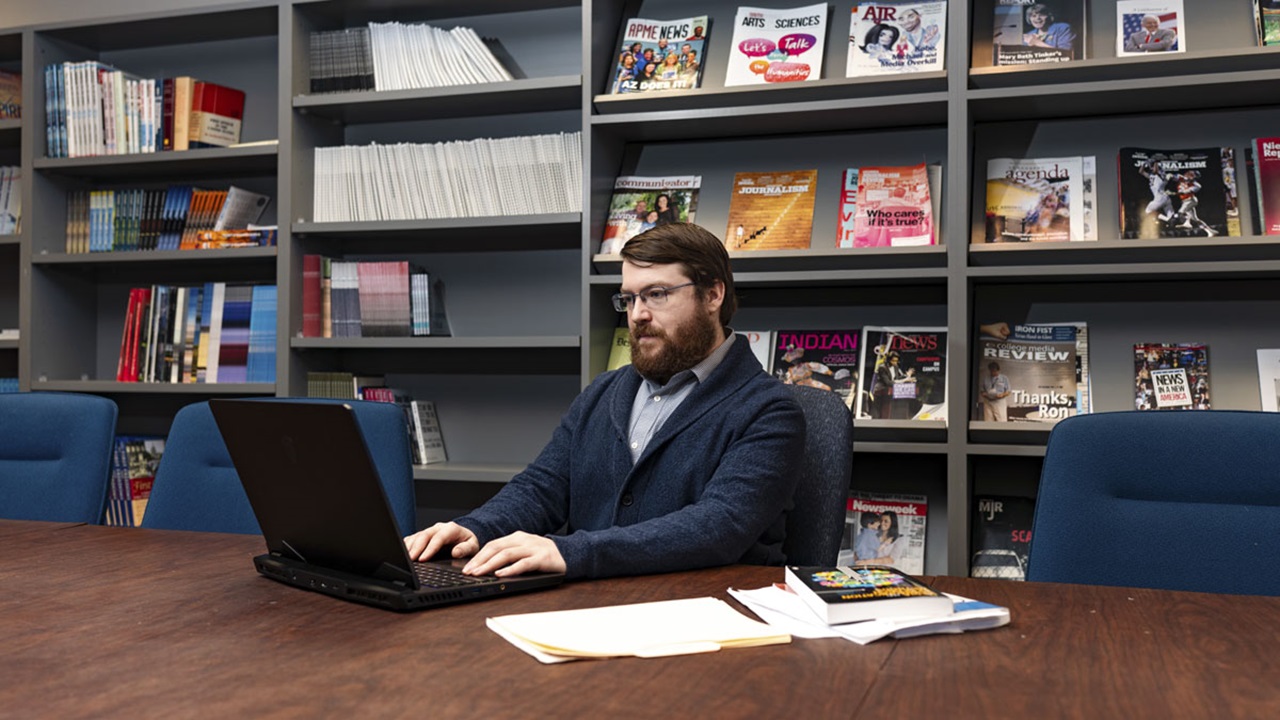USD Researchers Study AI and Human Interaction in Crisis Management and Beyond

Travis Loof, Ph.D., the main author of the study and assistant professor of media and journalism at USD, says participants read an identical press release detailing how a fictitious organization distributed contaminated products to the public.
One release was attributed to Chatbot AI Agent, and the other was created by Pat Kelly, media representative. Individuals in the study then answered a series of questions related to trust, reputation and credibility. In these areas, there was little difference between AI- and human-generated content.
“The findings essentially suggested that people really didn't care if they received this crisis communication information from artificial intelligence,” says Loof, who also directs the communication graduate program shared between the Department of Communication Studies and Department of Media & Journalism at USD.
Loof says this information will help researchers develop an understanding of how individuals acquire a mental model, or framework, for how we understand AI and what we expect from this technology.
“People know what ‘Terminator’ is and all about the sci-fi stuff with AI,” Loof says. “But how it looks in practice is not flashy. It's sort of boring. It does the job it is supposed to do.”
Using AI to communicate about a crisis has practical benefits. “In a crisis communication environment, timing is key,” Loof says. “If you respond to something faster, you may mitigate a lot of damage. Artificial intelligence is always on, and it’s always ready to respond.”
Loof’s research, which was published in the Fall 2023 issue of the Iowa Journal of Communication, used data collected from 2019. Considering the growth in publicly available AI tools in the past few years, Loof says he’s planning to conduct the study again.
Loof’s research interests also extend to the AI-human dynamic in the workplace.
He recently published an article, “My Co-Worker is a Real Tool: Perceptions of Human-AI Teamwork,” in the Fall 2023 issue of the Newhouse Impact Journal out of Syracuse University. The article urges researchers from disciplines including media, communication and STEM fields to come together to understand how human-AI teams function and how their work is perceived by others. Loof already has one such study in the works.
Understanding how we make sense of AI and its function in the workplace will help harness its potential and keep humans as a central part of the equation. “We don’t want to arrive at the future and be ill-prepared,” Loof says.
Undergraduate and graduate students play a large role in Loof’s research at USD.
“I tell all of my students that you need to move from being a knowledge consumer to being a knowledge producer,” he says. “Research is also a marketable skill. You’re learning a lot of transferable skills that employers want to see. You’re showing involvement, learning time management, meeting deadlines and gaining presentation skills.”
USD senior Rachel Spinks appeared as an author on both research papers mentioned above and has worked with Loof since the beginning of her junior year.
The media and journalism major from Papillon, Nebraska, was attracted to research on AI due to its transformative potential. “It was intriguing that this tool had the inevitability to affect every single person, whether individuals were conscious of it or not,” Spinks says.
Spinks says Loof invites students in his research lab to employ creative ways to understand AI-human interaction. “For instance, I just utilized a fantasy theme analysis – analyzing policy sentiment like a story book with characters, setting, plot – and a sociotechnical imaginary analysis approach, which is borrowed from the world of anthropology, to understand what major policy makers are saying about AI usage for mission specific goals for the intelligence community and U.S. Homeland Security.”
Joining Loof’s research lab has taught Spinks new skills and opened doors for collaboration and additional academic honors – such as a recent award for the top paper at a major media and communication conference.
“I would highly recommend to anyone who is serious about learning to look into joining a lab,” Spink says. “Not only do you gain new critical thinking skills but also new perspectives on how the world works.”





